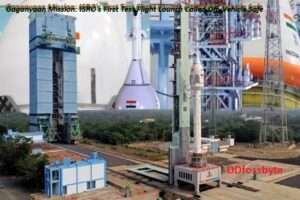The Indian Space Research Organisation (ISRO) has temporarily postponed the launch of the first uncrewed test flight, TV-D1, as part of the Gaganyaan Mission.ISRO’s First Test Flight Launch Called Off, Vehicle Safe.

Exploring the Gaganyaan Mission Delay and Its Significance
The Indian Space Research Organisation (ISRO) is undoubtedly a pioneering force in the field of space exploration. With its unwavering commitment to innovation, ISRO has consistently achieved remarkable milestones, captivating the world with its feats. The Gaganyaan Mission is one such ambitious project that has been the focus of attention, not just within the scientific community but also across the globe. In this article, we will delve into the recent development surrounding the mission, with a particular focus on the postponement of the first test flight launch and the safety measures in place.

The Vision of Gaganyaan Mission
The Gaganyaan Mission, a brainchild of ISRO, was initiated with a clear vision in mind – to make India a prominent player in human spaceflight. It aimed to mark a historic moment by sending Indian astronauts to space, placing the nation among the elite few that have achieved this feat. This endeavor was a testament to ISRO’s determination to push boundaries and make space exploration more accessible.
The Anticipation and Setbacks
The Gaganyaan Mission garnered enormous anticipation and support from both the Indian populace and the international space community. The first test flight launch was highly anticipated, as it marked a significant step towards realizing this ambitious goal. However, the recent announcement of its postponement has raised questions and concerns.

Reasons Behind the Delay
The decision to put the launch of TV-D1 on hold was made by ISRO after careful consideration and thorough evaluation of various factors. While the disappointment of the delay is palpable, it’s crucial to understand the reasons behind this decision.

- Safety First: ISRO has always prioritized the safety of its missions. The decision to delay the launch was primarily due to safety concerns. The space agency identified technical glitches that needed to be addressed before proceeding with the mission. This focus on safety is commendable and aligns with global space exploration standards.
- Technical Challenges: The intricacies of space missions are undeniable. Technical challenges often arise, demanding meticulous problem-solving. ISRO’s decision to delay the launch was guided by a commitment to resolving these challenges to ensure a successful mission.
- Global Standards: ISRO’s commitment to maintaining global standards in space exploration is evident in its willingness to delay the mission. By addressing technical issues, ISRO reinforces its dedication to upholding the integrity of its missions and the safety of its astronauts.

Assurance of Safety
It’s essential to emphasize that while the delay may be disappointing, it is a testament to ISRO’s commitment to safety and the success of the Gaganyaan Mission. The postponement ensures that all technical issues are adequately resolved, guaranteeing the safety of the astronauts who will embark on this historic journey.

ISRO has a remarkable track record of achieving excellence in its missions, and the Gaganyaan Mission is no exception. The postponement of the first test flight launch, though disappointing, is a proactive measure to ensure the mission’s safety and success.
The Road Ahead
As ISRO works diligently to address the technical challenges and ensure the safety of the Gaganyaan Mission, the world eagerly awaits the day when Indian astronauts will venture into space. This mission is a symbol of India’s commitment to space exploration and its aspiration to become a prominent player in the field.

The setback occurred when the scheduled lift-off failed to materialize, with engine ignition not proceeding as expected. Somanath reassured the public that the test vehicle was safe, emphasizing the need to investigate what went wrong. He stated, “The computer, which is responsible for critical functions, has halted the launch. We are committed to resolving the issue and rescheduling the launch promptly.”

This mission requires the development of several critical technologies, including a human-rated launch vehicle designed to transport crew members safely into space. Additionally, it necessitates the creation of a Life Support System that provides a terrestrial environment for crew members while in space, provisions for crew emergency escape, and the evolution of crew management aspects for training, recovery, and rehabilitation.

At a Glance :
- Test Vehicle D1 mission was initially scheduled for a lift-off from the first launch pad at 8 am which was revised to 8.30 am.
- “The lift-off is rescheduled at 08:30 Hrs. IST,” an ISRO update on ‘X’ said. An announcement to this effect was also made at the Mission Control Centre.
- The 13-hour countdown commenced on Friday at 7 pm.
- The test vehicle mission is predecessor to the Gaganyaan programme which aims to send humans into space on a Low Earth Orbit of 400 kms for three days and bring them safely back to the Earth.

The abort was due to an engine ignition issue that was detected during the pre-launch countdown. ISRO officials said that the issue is being investigated and that a new launch schedule will be announced soon.
The Gaganyaan Mission is India’s first human spaceflight mission. It is scheduled to launch in 2024. The mission will carry three astronauts into space for a seven-day orbital mission.

The delay in the first test flight launch of the Gaganyaan Mission is a clear demonstration of ISRO’s unwavering dedication to safety and the success of its missions.the delay in ISRO’s TV-D1 Flight Test is a temporary setback in their ambitious journey to realize the Gaganyaan Mission, aimed at sending humans into space. The organization remains committed to addressing the issues that led to the delay and rescheduling the launch. This mission holds the key to India’s future endeavors in space exploration and paves the way for human space travel on an unprecedented scale. While we eagerly await the next steps, it’s essential to recognize the significance of this postponement in ensuring a safe and successful mission.
